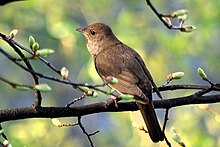| Thrush nightingale | |
|---|---|

| |
| At Uglich, Russia | |
| Scientific classification | |
| Domain: | Eukaryota |
| Kingdom: | Animalia |
| Phylum: | Chordata |
| Class: | Aves |
| Order: | Passeriformes |
| Family: | Muscicapidae |
| Genus: | Luscinia |
| Species: | L. luscinia
|
| Binomial name | |
| Luscinia luscinia (Linnaeus, 1758)
| |

| |
| Distribution of the Luscinia luscinia. Orange: breeding (summer) range, yellow: non-breeding (winter) range. | |
| Synonyms | |
|
Motacilla luscinia Linnaeus, 1758 | |
The thrush nightingale (Luscinia luscinia), also known as the sprosser, is a small passerine bird that was formerly classed as a member of the thrush family Turdidae, but is now more generally considered to be an Old World flycatcher, Muscicapidae.[2] It, and similar small European species, are often called chats.
It is a migratory insectivorous species breeding in forests in Europe and the Palearctic and overwintering in Africa. The distribution is more northerly than the very closely related common nightingale, Luscinia megarhynchos, which it closely resembles in appearance. It nests near the ground in dense undergrowth.
The thrush nightingale is similar in size to the European robin. It is plain greyish-brown above and white and greyish-brown below. Its greyer tones, giving a cloudy appearance to the underside, and lack of the common nightingale's obvious rufous tail side patches are the clearest plumage differences from that species. Sexes are similar. It has a similar but more powerful song than that of the nightingale.
- ^ BirdLife International (2016). "Luscinia luscinia". IUCN Red List of Threatened Species. 2016: e.T22709691A87882842. doi:10.2305/IUCN.UK.2016-3.RLTS.T22709691A87882842.en. Retrieved 12 November 2021.
- ^ Sangster, George; Alström, Per; Forsmark, Emma; Olsson, Urban (2010). "Multi-locus phylogenetic analysis of Old World chats and flycatchers reveals extensive paraphyly at family, subfamily and genus level (Aves: Muscicapidae)" (PDF). Molecular Phylogenetics and Evolution. 57 (1): 380–392. Bibcode:2010MolPE..57..380S. doi:10.1016/j.ympev.2010.07.008. PMID 20656044.
